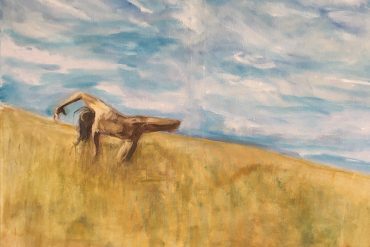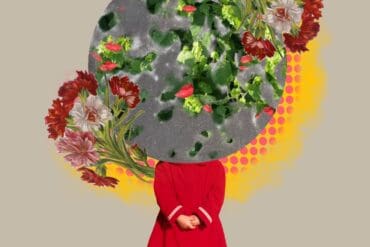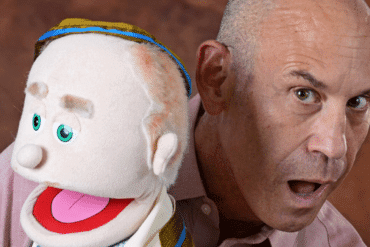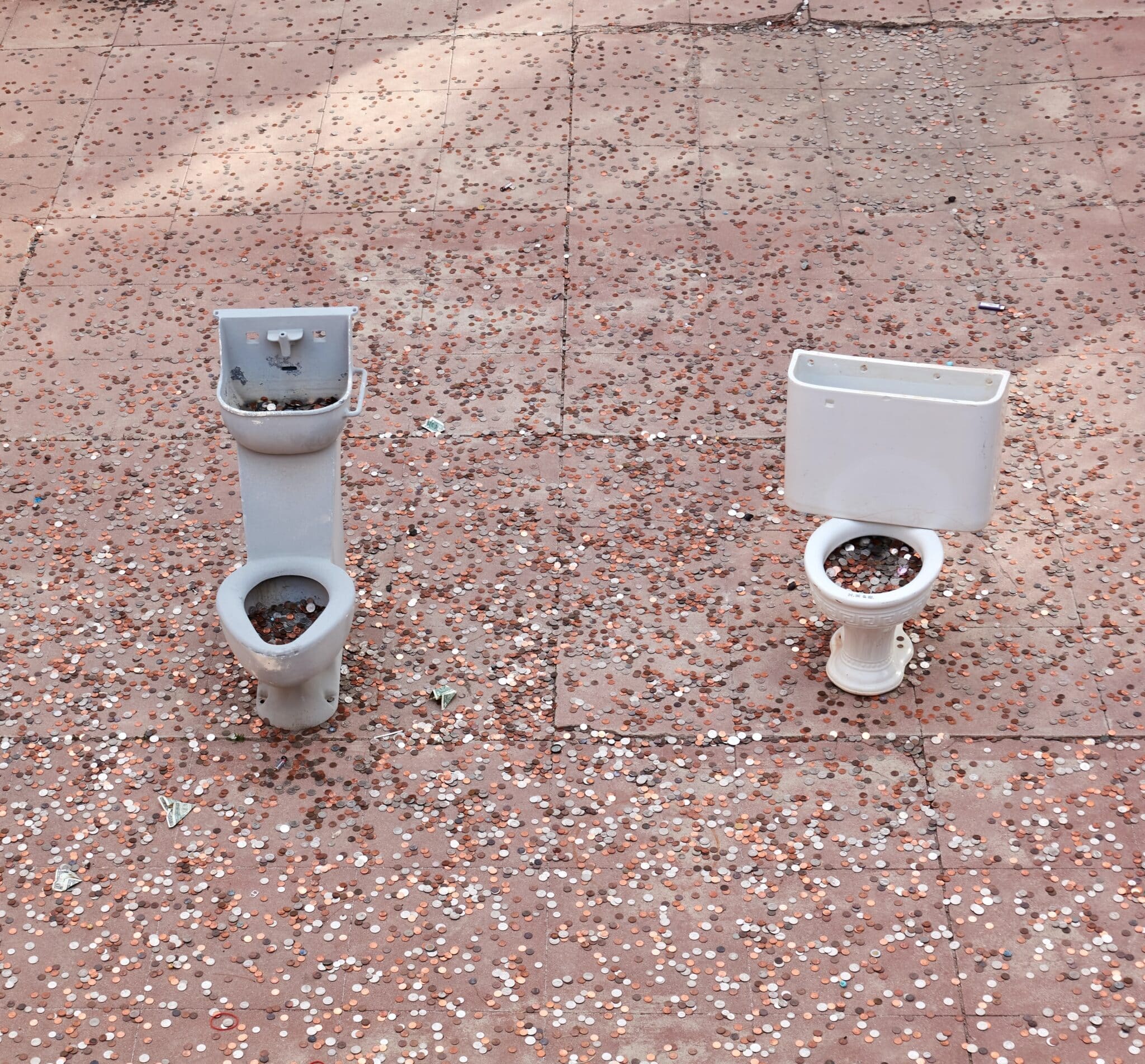‘Surprise! Surprise!’ A Potty Training Mystery and a Misadventure
Author’s Memo
Parenting is akin to stepping into that chamber Jeff Goldblum (Dr. Seth Brundle) fashioned in the movie The Fly (1986) – you’re in there crouched nakedly, trusting in the science, the years of preparation, study, and life experience roiling at a rich apotheosis, but you’re unaware of what’s gotten in there with you. You have to find out. You have to evolve. And furthermore, you have to put the pieces together in some meaningful order to, as Dr. Brundle eventually concludes, embrace the change within – warts and all. You step into the chamber as one thing and exit as another, more highly advanced version of yourself.
Which brings us to the world of potty-training.
As a first-time father who came from a Black single-parent home, you tend to overcompensate. And by that I mean, you scrutinize everything, every gesture of your child, the breathing patterns in the crib (if it’s too slow, or too fast), and if you’re a writer, you make all sorts of notes, audio recordings and various musings to understand how the world is changing around you. How this little being who you have to care for, feed, and nurture, is both a part of your DNA and simultaneously hacking it to their own ends. If you are tough as steel, or of a comparable metallic makeup, parenting makes you malleable, susceptible to extreme forms of heat that warp time and space, and your conception of it.
What this essay tries to capture is both the wonder and the inherent horror in potty training.
I wish I had made some video recordings of this phase, but instead, I took some notes, and eventually tried to write it down for initially an audience of one, but now, I hope to share this with others – to show that Black fathers are not always absorbed in “guy stuff,” but rather, we can care as deeply as our maternal counterparts. Maybe it leans differently, speaks in a language foreign even to ourselves, but becoming a father makes you deconstruct the word family down to its meaning and foundations.
Black families are complicated, but if happy families are all alike in the way Tolstoy described them, we certainly were. I find this essay to be a wonderful snapshot of 2011, a time when a very exemplar Black family occupied the White House, and another Black father displayed his love, fascination, and quizzical moments with his own daughters to the broader world. This was before Trayvon Martin, and those stark reminders that came afterwards to illustrate how being Black in America carried with it the markers of “the other,” or as Franz Fanon put it, “The imagination and the imaginary are possible only to the extent that the real world belongs to us.”
To be fair, this was a tough essay to write, or rather to “write around” the obvious ick factor, but the Autoethnographer’s special theme of “Laughter” reminded me about how much my family and I laughed about this months later – even after my daughter had gotten her potty-training driver’s license. I originally had hoped to write a series of parental vignettes for Parenting magazine, but got too busy at the daily grind of parenting to see this idea through.
In today’s polarized society where the cultural divide seems to be spreading, I think all parents – Black, White, Indigenous, and others – can attest to the difficulties of shifting from diapers to the potty, and then to the not-so-subtle horrors of teaching your kid how to use the public restroom.
But that’s another story …
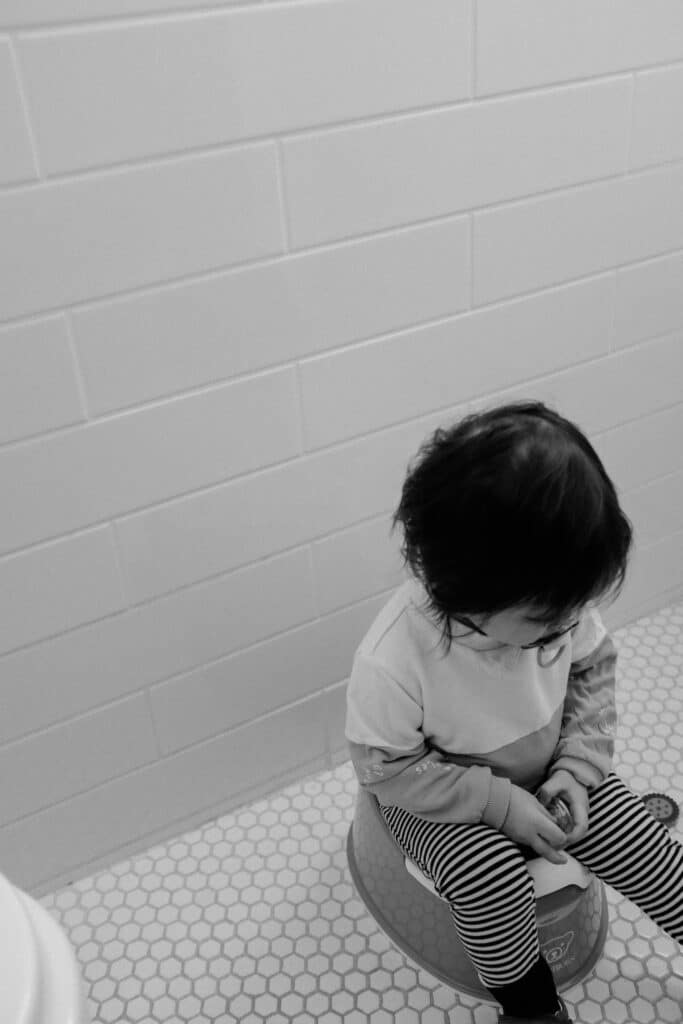
‘Surprise! Surprise!’ A Potty Training Mystery and a Misadventure
It started with a cookie in a backpack.
“Want a cookie?” my daughter asked.
She was rearranging cookies in her toy Cookie Monster’s backpack, a red plastic compartment that snapped open and closed, while I sat on the floor watching her. We played this game half a dozen times before. She’d gather a few of the cookies, put them in Cookie Monster’s backpack, then offer me one. “Um, okay, I’ll take a cookie,” I said.
She had arranged each one with care. Proudly pulling them out one by one, snapping them back in, and dragging Cookie Monster along with her from room to room. The batteries had long died, so the automatic chewing action was essentially disabled, his voice box, silenced. She rammed cookies down Cookie Monster’s throat with gleeful aplomb.
I held out my hand and she gave me the cookie. Like any plastic cookie you’d find as an accessory in a child’s toy chest, it was bumpy with an assortment of chocolate chips. Cookie Monster loves cookies, especially chocolate chip cookies. Everyone knows that. But this cookie felt so irregular…and it wasn’t made from plastic.
I decided to put it to a smell test, and it was immediately clear what bakery Cookie Monster purchased his cookies from. “No, Chelsea,” I said. “That’s not a cookie. Why didn’t you boo-boo in the pot?”
I was disgusted. And of course, she shot back that quizzical look, which basically said: Why in the world would I do that when I can make amazing things out of it? Gee, Dad, what’s eating you?
As quickly as I could, I got a piece of tissue and wrapped it tightly around the “cookie artifact,” flushed it down the toilet, then washed both of our hands – several times. I closed Cookie Monster’s backpack. At two and a half years old, Chelsea wasn’t potty trained and we still made those late night diaper trips (#4 size) despite our futile protestations. The exchange usually went something like this:
“How many do we have left?”
“One.”
“One?”
“Oh, crap.”
“Can she go the night, or should someone go out to get some diapers?”
Someone always meant me.
“It’s so late.”
We usually checked every overnight bag, the crevices of drawers, behind things it couldn’t possibly be behind, to no avail. It was almost always after ten-thirty at night. After she was sleeping soundly. After we were feeling exhausted.
“How soaked would she be in the morning?”
“I dunno. What if she has to crap?”
“Okay, okay. I’m going.”
My wife and I had started potty training her (so far) with varying degrees of success. As it turned out, pee-pee warnings were more easily grasped than the other kind. That was the mystery. She was particularly proud of her little doo-dads, to the point where she would fool my wife and I into believing progress was actually being made.
“Mommy and Daddy,” she’d call. “I boo-booed!”
And it would turn into a scavenger hunt because it was never in the pot. “Now, Chelsea,” we’d say. “This is where you should go.” Pointing to the pink and white potty. “Not here.” Indicating all parts of the house. We were feeling annoyed. We would find a “plague of droppings” on the carpet, and we’d go over the same speech. Clearly, we were failing in the potty training department. She just wasn’t getting it.
One afternoon, at her grandparent’s house, Chelsea proudly told them: “I boo-booed!”
“That’s great, Chelsea,” said my mother-in-law. “Did you go to the pot?”
“No,” she said.
“Well, Chelsea, where did you go?”
She thought about it a moment. Then: “I boo-booed!”
And so, carefully, as they explained to me, they searched the house, and when they were just about to give up, it turned up. In a basket.
“Surprise!” Chelsea said. She walked the empty clothesbasket up the stairs. They peered inside and found the purloined element. (Thankfully, they did not harm any apparels during the recounting of that anecdote.)
Weeks passed more or less uneventfully, with one potty training disaster after another (this was becoming the norm). While potty training sort of moved to the background, I tried to keep on top of other things – like our storytelling time.
I try my best to integrate storytelling time in her schedule. With a portable DVD player, and a kid’s tablet at arm’s reach it’s important now more than ever to interact with your kid in meaningful ways. No digital distractions (at least that’s what I’ve read in some parenting magazines). I do have a few books downloaded on my iPad that we read together and enjoy (particularly, “Puff ‘n Toot”). Chelsea’s own collection of books (and comics) are expanding. So, one afternoon she was going through her collection trying to sort out the proper book for storytelling time.
“What’s it going to be?” I asked.
“How ‘bout this one?”
She selected a book about bugs. It was one of the first books which I bought for her after her birth. As usual, Chelsea settled down in my lap, and I started reading to her. I was enjoying it, and she was enjoying the story of how caterpillars turn into butterflies, when I found a foreign object lodged in the middle of the book. She beamed at me so innocently then spread her arms out wide. “Surprise!”
And so, we went through the hand washing and scolding, the whole thing playing like a vaudeville routine. Her clever use of a bookmark didn’t escape me entirely, but this potty training business was getting awfully convoluted (and we were still buying pull-ups). But things did evolve.
Some weeks later, she grew out of that phase and entered another. She would venture off to her room, or some other part of the house. If you peeked in at her, she’d say, “No!” and slam the door. Usually, she’d leave a stinky pull-up for us to discard. Then, after days, weeks of lectures, wildly gesticulating hand gestures, she just got it. She had finally potty training.
These misadventures weren’t quite as amusing then as they are now, because there was so much to fear: Did she ever eat any of it? Is there still some in my house, or hidden in one of her books? And, inevitably, am I a bad parent?
Children are so unpredictable, and my daughter’s potty training boot camp taught me more about our relationship than I would have expected. These were gifts from her. Disgusting, disquieting, unbelievably strange gifts, which jumped out at you with the ferocity of a horror movie. But it was all done out of love, and that’s the sort of thing only a parent would understand.
That Cookie Monster toy still resurfaces from time to time, but I’m not brave enough to take a whiff of that backpack. Some mysteries are best left unsolved.
Credits
Image of a child in a potty training by Charles Deluvio for Unsplash
Featured Image by Simon Hurry for Unsplash
Learn More
New to autoethnography? Visit What Is Autoethnography? How Can I Learn More? to learn about autoethnographic writing and expressive arts. Interested in contributing? Then, view our editorial board’s What Do Editors Look for When Reviewing Evocative Autoethnographic Work?. Accordingly, check out our Submissions page. View Our Team in order to learn about our editorial board. Please see our Work with Us page to learn about volunteering at The AutoEthnographer. Visit Scholarships to learn about our annual student scholarship competition.
Cornelius Fortune’s work has appeared in Yahoo News, CinemaBlend, The Advocate, The Novel & Short Story Writer’s Market, and others. He holds an MA in English Literature.


